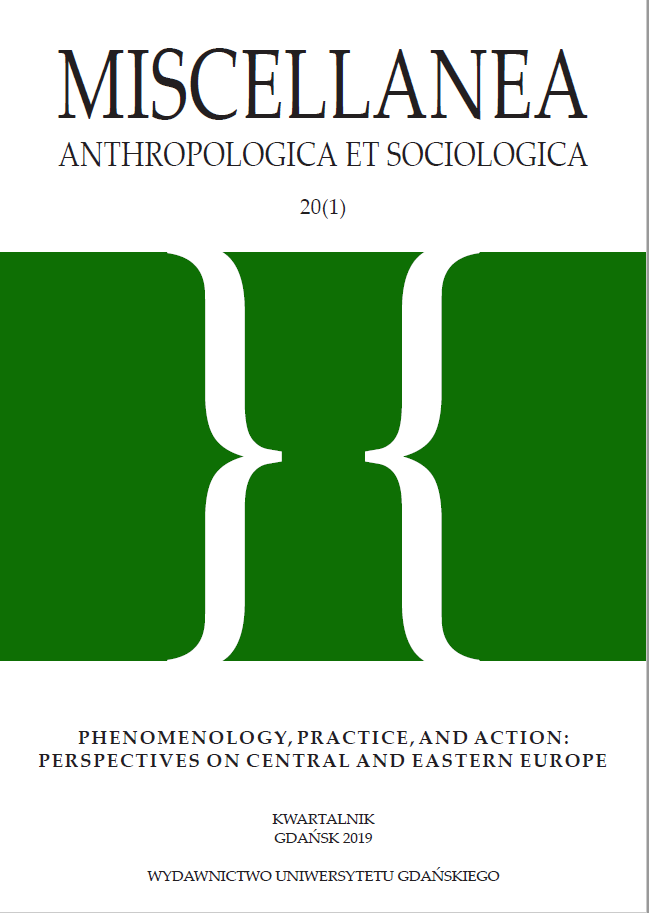The Ego as Moral Person. Husserl’s Concept of Personhood in the Context of his Later Ethics
DOI:
https://doi.org/10.26881/maes.2019.1.01Słowa kluczowe:
Personalistic ethics, categorical imperative, absolute ought, person, value theory, HusserlAbstrakt
Husserl’s philosophy has ethical roots. In the well-known Crisis text, he speaks of the task of philosophers as “functionaries of mankind” (Crisis: 17). “To be human is essentially to be a human being in a socially and generatively united civilisation” (Crisis: 15). The philosopher bears a responsibility for “the true being of mankind” (Crisis:17) for it is through philosophy that mankind’s being towards a telos can come to realisation. This task, to which “we are called” (Crisis: 17) can only be accomplished on the grounds of the human person as a moral person. In the following I would thus like to show that Husserl’s statements are only comprehensible from out of the ethical-moral reflections underlying his concept of personhood in the context of his later ethical thought. An analysis of Husserl’s concept of personhood can shed light on the task of philosophy and make comprehensible not only his phenomenological ethics but also his phenomenological anthropology.
Downloads
Bibliografia
Hart J., 1992, The Person and the Common Life: Studies in a Husserlian Social Ethics, Dordrecht: Kluwer Academic Publishers.
Hart J., 1995, Husserl and Fichte – with Special Regard to Husserl’s Lectures on „Fichte’s Ideal of Humanity”, Husserl Studies, vol. 12, pp. 135–163.
Husserl E., 1959, Hua VIII, Erste Philosophie (1923/24). Zweiter Teil. Theorie der Phänomenologischen Reduktion, R. Boehm (ed.), The Hague: Martinus Nijhoff.
Husserl E., 1973, Hua XIV, Zur Phänomenologie der Intersubjektivität. Texte aus dem Nachlass. Zweiter Teil: 1921–1928, I. Kern (ed.), The Hague: Martinus Nijhoff.
Husserl E., 1973, Hua XV, Zur Phänomenologie der Intersubjektivität. Texte aus dem Nachlass. Dritter Teil: 1929–1935, I. Kern (ed.), The Hague: Martinus Nijhoff.
Husserl E., 1974, The Crisis of European Sciences and Transcendental Phenomenology, transl. D. Carr, Evanston: Northwestern University Press.
Husserl E., 1974, Hua XXVIII, Vorlesungen über Ethik und Wertlehre (1908–1914), U. Melle (ed.), Dordrecht: Kluwer Academic Publishers.
Husserl E., 1989, Hua XXVII, Aufsätze und Vorträge (1922–1937), T. Nenon, H.R. Sepp (eds.), Dordrecht–Boston–London: Kluwer Academic Publishers.
Husserl E., 1989, Ideas pertaining to a Pure Phenomenology and to a Phenomenological Philosophy, second Book, Studies in the Phenomenology of Constitution, transl. R. Rojcewicz, A. Schuwer, Dordrecht–Boston–London: Kluwer Academic Publishers.
Husserl E., 2002, Hua XXXV, Einleitung in die Philosophie. Vorlesungen 1922/23, B. Goosens (ed.), Dordrecht–Boston–London: Kluwer Academic Publishers.
Husserl E., 2004, Hua XXXVII, Einleitung in die Ethik. Vorlesungen Sommersemester 1920/1924, H. Peucker (ed.), Dordrecht–Boston–London: Kluwer Academic Publishers.
Husserl E., 2012, Hua Mat. IX, Einleitung in die Philosophie 1919/1920, H. Jacobs (ed.), Dordrecht–Heidelberg–New York–London: Springer.
Husserl E., 2014, Hua XLII, Grenzprobleme der Phänomenologie. Analysen des Unbewusstseins und der Instinkte. Metaphysik. Späte Ethik. Texte aus dem Nachlass (1908–1937), R. Sowa, T. Vongehr (eds.), Dordrecht–Heidelberg–New York–London: Springer.
Husserl E., unpublished manuscript, Ms. A VI 21, p. 21a and b, quoted in Marbach 1974: 315.
Husserl E., unpublished manuscript, Ms. E III, 2, p. 5a, quoted in Marbach 1974: 304.
Husserl E., unpublished manuscript, Ms. B I 21, p. 55, quoted in Melle 2007: 12.
Luft S., 2012, The Subject as Moral Person. On Husserl’s late Reflections concerning the Concept of Personhood [in]: Investigating Subjectivity. Classical and New Perspectives, G.-J. van Der Heiden, K. Novotny, I. Römer, L. Tengelyi (eds.), Leiden–Boston: Brill, pp. 25–43.
Marbach E., 1974, Das Problem des Ich bei Husserl, The Hague: Martinus Nijhoff.
Melle U., 2008, Einleitung to Husserl E., 1988, Hua XXVIII, pp. xiii–xlix.
Melle U., 1991, The Development of Husserl’s Ethics, Études Phénoménologiques, no. 13–14, pp. 115–135.
Melle U., 2002, From Reason to Love [in:] Phenomenological Approaches to Moral Philosophy: A Handbook, J. Drummond, L. Embree (eds.), Dordrecht: Kluwer Academic Publishers, pp. 229–248.
Melle U., 2007, Husserl’s Personalist Ethics, Husserl Studies, vol. 23, pp. 1–15.
Peucker H., 2008, From Logic to the Person: An Introduction to Edmund Husserl’s Ethics, The Review of Metaphysics, vol. 62, pp. 307–325.
Peucker H., 2010, Aristotelische Elemente in der Ethik Edmund Husserls, Philosophisches Jahrbuch, vol. 117, pp. 54–68.
Peucker H., 2011, Die ethischen Grundlagen von Husserls Philosophie, Journal Phänomenologie, vol. 36, pp. 10–20.
Ricœur P., 1992, Oneself as Another, transl. K. Blamey, Chicago–London: The University of Chicago Press.
Sokolowski R., 2017, Moral Action. A Phenomenological Study, Washington, D.C.: The Catholic University of America Press.
Sowa R., Vongehr T., 2012, Einleitung to Husserl, Edmund, 2014, Hua XLII, pp. xix–cxv.

 Uniwersyteckie Czasopisma Naukowe
Uniwersyteckie Czasopisma Naukowe




